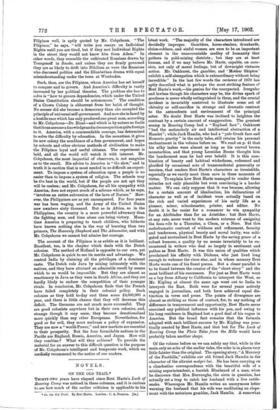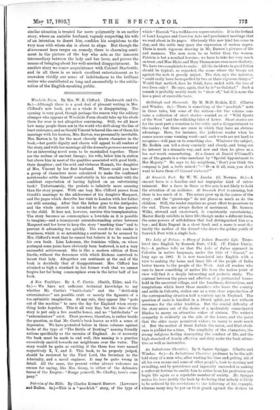NOVELS.
ON THE OLD TRAIL.*
THIRTY-TWO years have elapsed since Bret Harte's Luck of Roaring Camp was noticed in these columns, and it is curious to see how much of the earlier criticism is applicable to his • On the OW Trail. By Bret Harte. London: C. A. Pearson. [63.]
latest work. " The majority of the characters introduced are decidedly improper. Gamblers, horse-stealers, drunkards, sluice-robbers, and sinful women are sure to be an important element in the nnaccountable medley of humanity that gathers in gold-mining districts ; but they are at least human, and if we may believe Mr. Harte, capable, on occa- sion, not only of moral feelings, but of downright virtuous action. Mr. Oakhurst, the gambler, and Mother Shipton ' exhibit a self-abnegation which is extraordinary without being incredible." In the last few words the reviewer of 1870 has aptly described what is perhaps the most striking feature of Bret Harte's work,—his genius for the unexpected. Irregular and lawless though his characters may be, the divine spark of goodness is never wholly extinguished in them, and the crucial incident is invariably contrived to illustrate some act of chivalry or self-sacrifice in strange and dramatic contrast to the antecedents and environment of the principal actor. No doubt Bret Hart() was inclined to heighten the contrast by a certain amount of exaggeration. The greatest scamp in Roaring Camp had a " Raphael face"; Oakhurst " had the melancholy air and intellectual abstraction of a Hamlet"; while Jack Hamlin, who had a " pale Greek face and Homeric gravity " in the early tales, still retains his personal enchantment in the volume before us. We read on p. 41 that his silky lashes were almost as long as his curved brown moustachios, and that young Leonidas Boone thought him the handsomest man he had ever beheld. It is this com- bination of beauty and habitual wickedness, redeemed and glorified by occasional acts of transcendental generosity or heroism, that renders Bret Harte's characters so irresistible, especially as we rarely meet them save in these moments of virtue. To explain how Bret Harts managed to render these miracles not only plausible but even convincing is a harder matter. We can only suppose that it was because, allowing for a certain amount of idealisation, his delineations of character as well as of incident were actually based on the rich and varied experiences of his early life as a pioneer, miner, schoolmaster, printer, and editor. No doubt it is far easier for a romancer to win sympathy for an Alcibiades than for an Aristides : but Bret Harte, at any rate, never went to the modern extreme of assigning the beau role to a Thersites, a Cleon, or a Nero. But this melodramatic contrast of wildness and refinement, ferocity and tenderness, physical beauty and moral laxity, was miti- gated and neutralised in Bret Harte by the saving grace of a robust humour, a quality by no means invariably to be en- countered in writers who deal so largely in sentiment and pathos as Bret Harts. It was this union of qualities which proclaimed his affinity with Dickens, who just lived long enough to welcome the risen star, and in whose memory Bret Harte wrote one of his finest poems. But a closer parallel is to be found between the creator of the "short story" and the most brilliant of his successors. For just as Bret Harts went as a boy from Albany to California to interpret the West, so Mr. Kipling at almost the same age went out to India to interpret the East. Both were for several years actively engaged in journalism, and both have achieved equal dis- tinction in verse and prose. The points of divergence are almost as striking as those of contact, for, to say nothing of difference in temperament and opportunity, Bret Harte never exercised any political influence with his pen, and owing to his long residence in England lost a good deal of his vogue in America. But the broad fact remains that the formula adopted with such brilliant success by Mr. Kipling was prac- tically created by Bret Harte, and that but for The Luck of Roaring Camp the Plain Tales from the Hills would have probably taken another shape.
Of the volume before us we can safely say that, while in the main only an echo of the earlier tales, the echo is in places very little fainter than the original. The opening story, "A Mercury of the Foothills," exhibits our old friend Jack Hamlin in the character of the altruist malgrg lui. He has been carrying on a clandestine correspondence with the beautiful wife of a mining superintendent, a boorish Bluebeard of a man, when he discovers that Mrs. Burroughs, the siren in question, has actually set a trap to catch her husband with a live rattle- snake. Whereupon Mr. Hamlin writes an anonymous letter warning the husband that his wife was meditating an elope- ment with the notorious gambler, Jack Hamlin. A somewhat
similar Situation is treated far more poignantly in an earlier story, where an amiable husband, vaguely suspecting his wife of an intention to desert him, confides his suspicions to the vary man with whom she is about to elope. But though the denouement here verges on comedy, there is charming senti- ment in the picture of the boy who acts as the innocent intermediary between the lady and her lover, and proves the means of bringing about her well-merited disappointment. In another story we renew acquaintance with Colonel Starbottle, and in all there is so much excellent entertainment as to reawaken vividly our sense of indebtedness to the brilliant writer who contributed so long and successfully to the exhila- ration of the English-speaking public.







































 Previous page
Previous page